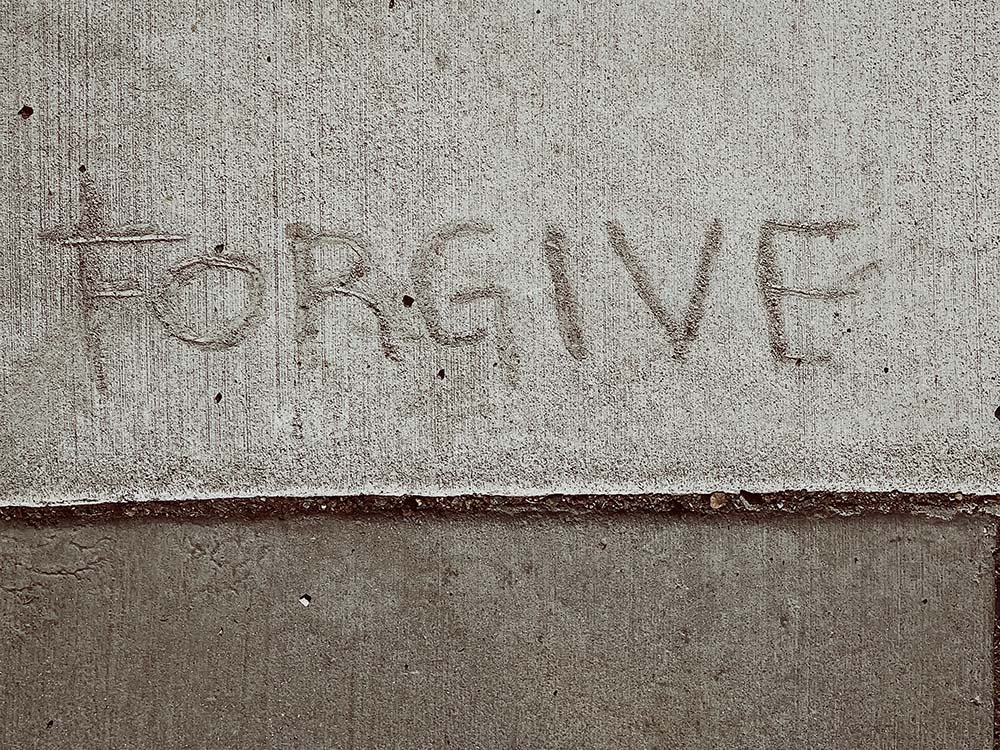
(Unsplash/Christopher Stites)
It can be a pretty stiff test of character to not only forgive but also to ask for forgiveness. There's pain, there's suffering, there's challenge. In fact, at times, it seems an impossible task.
Jesus, the crucified savior, is the ultimate role model who not only forgave the sins of his followers but also asked his Father to forgive those who sent him to an ignominious death on the cross: "Forgive them for they know not what they do."
Forgiveness reflects the depth of our connection to God and begs us to plumb the depths of our souls and do as Jesus did.
One Sunday, I was an eyewitness to forgiveness, a moment I never thought I would see happen. This forgiveness prevented the family Sunday dinner from turning into an awkward freefall.
There were 12 of us, aunts, uncles, nieces, nephews gathered around the dinner table enjoying my mother's exceptional cooking when my dad casually asked my aunt, "Mary, how are you doing?"
"How do you think I'm doing, Bill?" she replied with a sharp, angry edge to her voice. "It's a man's world, you know what I mean."
Then, suddenly and unexpectedly, my aunt Mary started taking my pop to task because he was the quintessential patriarchal father who changed tires instead of diapers, did the handyman work instead of the laundry, put the food on the table but never cooked it, checked his emotions and believed mothers should be in the home taking care of the kids. My aunt, a mother of two, was working her way up in management at her job, but thought she wasn't rising fast enough for her considerable skills and intelligence: She was a smart lady, once the second-ranked American women's chess player in the United States.
Advertisement
Silence stilled the room as if the dinner table had lost its vital ballast.
At 13 years old, I sat next to my father and thought, Oh no, this is not going to be good. I waited for an angry explosion from my father. He and my aunt had locked horns in the past about this particular issue of women in the home and the workplace, and had extruded their positions only through their own lens. My father thought my aunt had devalued, or perhaps had not respected, his success as a businessman, husband and father; my aunt thought my pop had devalued her as a woman.
Instead, my father listened patiently without interrupting my aunt. The Greek philosopher Heraclitus called the soul "a spark of the substance of the stars." This Sunday my father embraced that spark.
"You deserve better, Mary," he simply said to my aunt. "I hope you get what you deserve."
My aunt's jaw dropped to her ankles, and she said to my pop, "I'm sorry for taking my frustration out on you, Bill. Forgive me."
My father responded as if nothing had happened. There was purity in the forgiveness by both parties. It was the fresh smell of two roses side-by-side.
Whispers of a higher voice had filtered into my dad's heart and soul. His unyielding Catholic faith had always made him aware of God as his source, and I think he put that faith in action this Sunday with my aunt. He saw in her something of himself, someone who simply wanted to better herself and feel the joy and satisfaction of professional success as he had.
My aunt Mary went on to a long, productive and successful career as a senior marketing analyst. And my father cheered her on.
'As the Lord has forgiven you, so must you also do.'
—Colossians 3:13
I think both learned more about each other and themselves that Sunday. I believe that God was so in-dwelling that he inspired both of them to be more cognizant of their own imperfections and failings, to be more aware that God had forgiven them: "As the Lord has forgiven you, so must you also do" (Colossians 3:13). It was a relinquishing, an atonement of their attitudes toward each other.
I, too, learned a lesson that Sunday. Instead of shouting at each other over real or perceived missteps or misdeeds, forgiveness can be an awakening, a ripening of virtue in which we relinquish our anger, vengeance, grudges and bruised egos to understand ourselves and others better. Without it, there can only be silence for the heart and soul to mourn.
As I age, I have realized — and appreciated — how many times the virtues of forgiveness and mercy have been shown to me over the years. Why, just recently, a guy in the car behind mine unmercifully kept honking his horn at me. When I looked in the rearview mirror, I could make out that he was shouting profanities at me. I could only guess: I was driving too slowly for him, and he was angry as a blister in the noonday sun.
When I changed lanes and he pulled up alongside me at a traffic light, he saw that I was someone he knew. He smiled sheepishly and gave me the thumbs-up sign. I returned the hand gesture. I forgave him. It was a gift I received one Sunday from my dad and my aunt.







